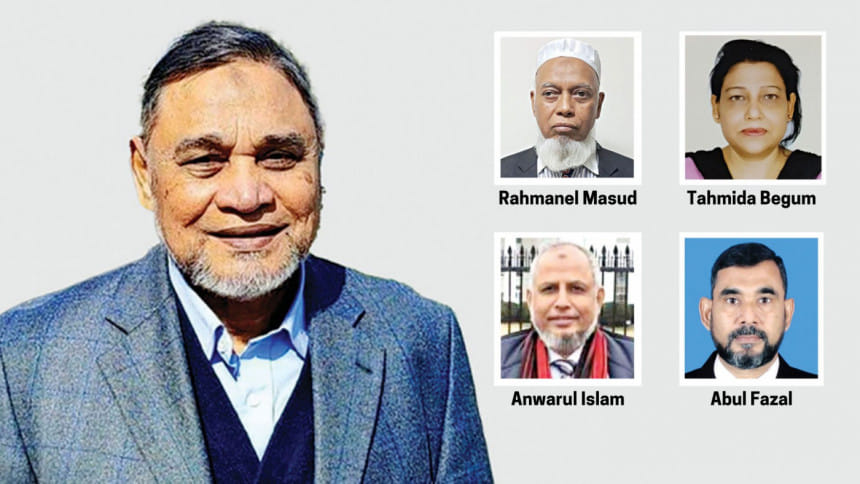New Election Commission takes shape

Amid much speculation about when the next election might take place, former health and energy secretary AMM Nasir Uddin has been appointed as the new chief election commissioner.
President Mohammed Shahabuddin yesterday also appointed retired additional secretary Anwarul Islam Sarkar, retired district and sessions judge Abdur Rahmanel Masud, retired joint secretary Begum Tahmida Ahmad, and Brig Gen (retd) Abul Fazal Md Sanaullah as election commissioners.
Nasir is also a member of the local government reform commission formed on November 18. The appointments are made as political parties have for weeks been asking when the election will be held.
Chief Adviser Prof Muhammad Yunus on November 17 said the government would issue a roadmap to the election as soon as decisions on electoral reforms were made.
The Election Commission (EC) had been vacant since September 5 when members of the previous commission, led by Kazi Habibul Awal, resigned. The EC had never been vacant for this long since it was founded in 1972.
Awal and the other commissioners were about halfway through their five-year tenure.
On October 29, the interim government formed a six-member search committee led by Justice Zubayer Rahman Chowdhury of the Supreme Court's Appellate Division to come up with the names of two individuals for each EC membership.
BNP and several other parties proposed the names of Nasir and former secretary Shafiqul Islam as the chief election commissioner (CEC).
Nasir Uddin, aged 72, would be the 14th CEC and the seventh former bureaucrat to be in the position.
REACTIONS OF NEW COMMISSIONERS
Nasir said he would leave no stones unturned for a free, fair, and credible election. The commission will work independently with the goal of establishing people's right to vote.
"I am not interested in knowing who nominated me. I will work independently. If I find out which party chose me and which did not, it might make me biassed, even if subconsciously," he said.
"We must learn from [past ECs'] mistakes. We aim to avoid those flaws so that no allegations are raised against us."
All political parties desire a free and fair election, he said.
There are controversies regarding one particular party, he said, referring to the Awami League.
"I would rather not comment on this at the moment. When it is time for the election, we will see. You will see. We aim to include everyone in the electoral process, but for now, I refrain from making comments."
After meeting the other commissioners, he will sit with the electoral reform commission and set priorities.
Born in 1952 at Kutubdia, Cox's Bazar, Nasir studied economics at Chittagong University. He was a lecturer at the same department for a brief period before joining the civil service in 1979.
He was also a member of the Planning Commission and served as the secretary to the ministries of information, energy, and health before retiring in 2010.
Rahmanel retired as a member of the Administrative Tribunal-1 in Dhaka in 2017. He began his career in 1981 as a lawyer and joined the judiciary as an assistant judge in 1983.
He worked as an assistant registrar and deputy registrar at the High Court Division before being promoted as a district judge in 2000.
The former judge also taught law at private universities and wrote about legal matters.
Tahmida was born in Sunamganj. She joined the civil administration through the 11th BCS exams. She worked as a joint secretary to the civil aviation and tourism ministry and retired as a director of the Department of Jute in 2020.
Brig Gen (retd) Sanaullah joined the army in 1988 and served for 34 and a half years. His last work station was Bangladesh High Commission in Islamabad. Prior to this, he worked at the Bangladesh Embassy in Tehran. He also studied at Defence Services Command and Staff College, National Defence College, US Army Command and General Staff College, and College of Defence Management, India.
"I am grateful. This is a huge responsibility, but I am sure we will be able to meet people's aspirations," he said.
Anwarul joined the public service through the BCS exams in 1985. He retired as additional secretary to the sports ministry.


 For all latest news, follow The Daily Star's Google News channel.
For all latest news, follow The Daily Star's Google News channel. 





Comments